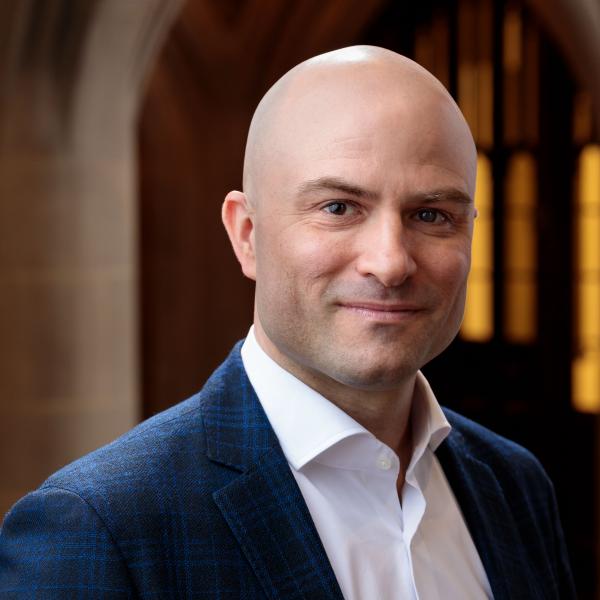
Biography
My work examines the conditions that enabled the literary representation of the first-person perspective in early modernity.
My first book, Coming To: Consciousness and Natality in Early Modern England (University of Chicago Press, 2020) examines the role played by poetry in the emergence of the concept of consciousness. Somewhere between the work of René Descartes in the 1640s and the writings of John Locke in the 1690s, the modern concept of consciousness was born. Coming To analyses the historical genesis of this concept by exploring the poetry and prose of John Milton and Thomas Traherne. I argue that these writers attempt to clarify the nature of consciousness by describing in first person terms what it is like for human thought to begin, by putting into words the moment when human life was first created or when embryonic awareness first flares into existence.
In John Donne's Physics (forthcoming, University of Chicago Press, Spring 2024), my co-author Elizabeth D. Harvey and I reconsider Donne’s representation of the body and embodiment in the Devotions Upon Emergent Occasions. Written during an epidemic that ravaged London in 1623, when Donne fell ill and was brought to the threshold of death, the Devotions records his wrestling with imminent death. He focalizes this account through the lens of a seventeenth-century England in the grip of profound epistemic, social, religious, and political change. John Donne’s Physics explores this work as Donne’s deeply personal engagement with emergent developments in natural philosophy, physics, and medicine. We see the Devotions as a continuation and culmination of the habits of thought and expression that Donne cultivated throughout his life. His career at the Inns of Court, his time at court, his travels, his immersion in scientific and medical knowledge, his love poetry, satires, verse letters, and elegies all shaped a poetic imagination that achieves full expression in the Devotions.
In Horizons of the Mind: Experiences of Self and World in Early Modern Persian and English Poetry, my co-author Jane Mikkelson and I construct a comparative literary history of mindedness. Early modern English and Persian literary traditions have never been thoroughly studied together. We argue for the necessity of this comparative work by bringing together two important philosophical poets—one from northern India, one from rural England—who both composed poetry that explores questions about the nature and structure of the human mind: Bidel of Delhi and Thomas Traherne. Separated by more than 5,000 miles, Traherne and Bidel articulated strikingly similar ideas about mind, self, and world during many of the same orbital circuits that the earth made around the sun. We reveal how these two seemingly unconnected poets belonged to a shared intellectual world, one shaped by the philosophy of Ibn Sīnā, known as Avicenna in Latin. Avicenna’s important interventions in psychology, medicine, metaphysics, logic, and other fields circulated widely throughout Afro-Eurasia and beyond, transforming intellectual cultures across the globe. Tracing some of the branching pathways by which Avicenna’s ideas travelled to England and India, we argue that Bidel’s and Traherne’s explorations of mind and self both belong to a shared world of Avicennan thought. Developing novel modes of comparison, we offer a new history of mindedness, reveal an Afro-Eurasian world of ideas hitherto overlooked by Euro-American scholarship, and account for the role played by poetry in early modern models of the mind.
In Life in Milton’s Late Poetry, I examine what early modern thinkers understood by the concept of life prior to the development of biology. The book routes a wide-ranging discussion of this concept through a treatment of Milton’s late poems: Paradise Lost, Paradise Regained, and Samson Agonistes. Exploring how Milton weaves his vast learning on life into his poetry, I show how Milton’s struggle to synthesize his theological, humanistic, philosophical, and literary inclinations enabled a poetry that represented life-as-object simultaneously with life-as-subject. The book approaches the topic of life from the vantage point of endeavor, a word that indexes the expense of effort and translates the Latin conatus, which was central both to religious debates and philosophical inquiry. I show that the capacity to endeavor or expend effort is what connects Milton’s abiding concern for freedom with his interest in life.
Select Publications
Books
- Coming To: Consciousness and Natality in Early Modern England (University of Chicago Press, 2020).
- John Donne's Physics. Co-authored with Elizabeth D. Harvey. University of Chicago Press, Spring 2024.
Articles and Book Chapters
- “‘Every Living Thing’: Life and Endeavor in Milton’s Paradise Lost,” Representations (forthcoming).
- “‘Worlds Together Shined’: Bidel, Traherne, and Collaborative Comparison,” co-authored with Jane Mikkelson, PMLA (forthcoming).
- “Fictions of Human Nature in Seventeenth-Century Poetry and Philosophy,” English Literary Renaissance 52.3 (2022): 358-70 (part of Theorizing Fiction in the Early Modern Period, a special issue edited by Wendy Beth Hyman and Jennifer Waldron).
- “What Was Early Modern World Literature?,” co-authored with Jane Mikkelson, Modern Philology 119.1 (2021): 166-88 (part of Multiplicities: Recasting the Early Modern Global, a special issue edited by Ayesha Ramachandran and Carina Johnson).
- “Confusion: Cymbeline, The Merchant of Venice, The Winter’s Tale,” in Shakespeare and Emotion, ed. Katharine Craik (Cambridge: Cambridge UP, 2020), 330-43.
- “John Donne, the Instant of Change, and the Time of the Body,” English Literary History (ELH) 85.4 (Winter 2018): 909-39 (recipient of the John Donne Society Award for Distinguished Publication).
- “Personhood and Impersonal Feeling in Montaigne’s ‘De l’exercitation,’” Modern Philology 114 (2016): 219-42.
- “Adamic Awakening and the Feeling of Being Alive in Paradise Lost,” Milton Studies 54 (2013): 29-58 (recipient of the Milton Society of America’s Albert C. Labriola Award).
- “Embodied Resonances: Early Modern Science and Tropologies of Connection in Donne’s Anniversaries,” co-authored with Elizabeth D. Harvey, English Literary History (ELH) 80 (2013): 981-1008.
Teaching
• Graduate: The Being of Effort in Early Modernity; Early Modern Natality; Milton and the Literature of Origins; The Uses of Fiction: Poetry and Philosophy in Early Modernity.
• Undergraduate: Inventing Consciousness: Literature, Philosophy, Psychology; Shakespeare II: Tragedies and Romances; Philosophical Perspectives I, Philosophical Perspectives II


